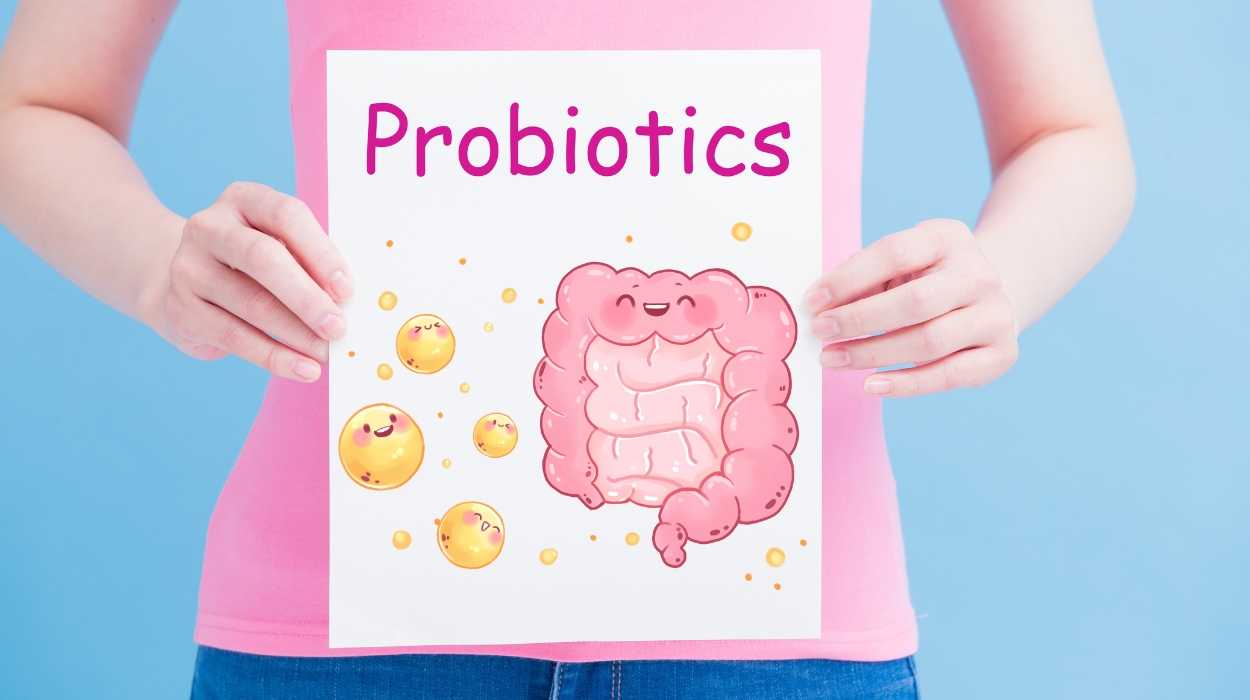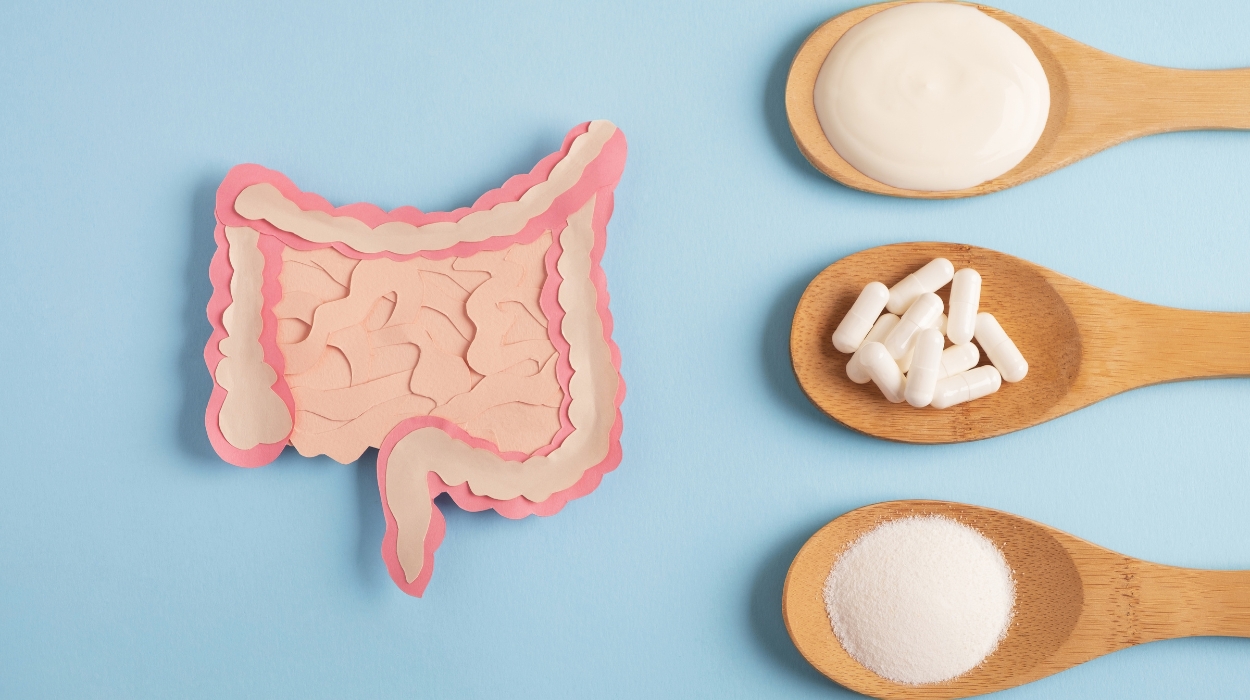 Expert's opinion
Expert's opinion
Expert's opinion
The article is a subjective view on this topic written by writers specializing in medical writing.
It may reflect on a personal journey surrounding struggles with an illness or medical condition, involve product comparisons, diet considerations, or other health-related opinions.
Although the view is entirely that of the writer, it is based on academic experiences and scientific research they have conducted; it is fact-checked by a team of degreed medical experts, and validated by sources attached to the article.
The numbers in parenthesis (1,2,3) will take you to clickable links to related scientific papers.
Probiotics For Weight Loss — Do They Really Work 2024?

Probiotics have been the subject of much scientific research in recent years, and new research shows there may be a link between probiotics and weight loss as well.
Almost each health issue has a relation with gut health and microflora. Therefore, probiotic supplementation may have many favorable outcomes for your overall health.
One of the main areas that have attracted much attention is the potential of taking probiotics for weight loss effects. While there is still much to be learned about how probiotics work in the body or the best probiotics for weight loss and how effective they are at promoting weight loss, there is evidence to suggest that they may be a valuable tool to treat obesity.
Can Probiotics Help You Lose Weight?
- Probiotics are live microorganisms that help you to lose weight by reducing inflammation, improving insulin sensitivity, and controlling appetite.
- Probiotics are beneficial for gut health and can help restore the balance of gut bacteria.
- Probiotics can also improve digestive health, help metabolic control, boost the immune system, and have mental health benefits.
Do Probiotics Help You Lose Weight?

So, can probiotics really help you lose weight? There are some promising findings that suggest that probiotics may be beneficial for weight management.
In a recent systematic review of 27 studies, probiotic intake has resulted in significant weight[1] reductions, even while maintaining habitual lifestyle habits or combined with energy restriction and/or increased physical activity for an average of 12 weeks.
It’s not entirely clear how probiotics might be promoting weight loss efforts. Still, there are several theories:
- Reducing inflammation: Probiotics may help to reduce inflammation in the body, which is thought to contribute to obesity.
- Improvement in insulin sensitivity: Probiotics can help to regulate blood sugar levels by regulating insulin secretion, which may prevent weight gain.
- Appetite control: Another possibility is that probiotics may affect appetite and food cravings. The microbiota, or gut microorganisms, are important for regulating many hormones. Even a great amount of serotonin, which helps mood enchantment and appetite regulation, is produced in your gut, showing a potential link here between your mood-regulating hormones, appetite, and gut health.
How Do Probiotics Work?
According to the definition provided by the World Health Organization, probiotics are live microorganisms[2] that, when administered in sufficient quantities, provide health benefits to the host.
They are usually friendly bacteria that are found in probiotic foods such as yogurt, kefir, and sauerkraut, as well as in dietary supplements.
These microorganisms are known to benefit the human body, particularly in the digestive system. Probiotics are believed to work by improving the balance of healthy bacteria in the gut, which can be disrupted by factors such as a poor diet, stress, and antibiotic use.
By promoting the growth of beneficial bacteria and suppressing harmful bacteria, probiotics may help to improve digestion, boost immune function, and reduce inflammation in the body.
How Probiotics Affect Your Body Weight Management
Probiotics and digestive enzymes for weight loss support are commonly used supplements for their potential benefits in improving digestion and nutrient absorption.
Probiotics can help to restore and maintain healthy gut microbiota, which is important for overall digestive health. In contrast, digestive enzymes can help to break down carbohydrates, fats, and proteins in food, which may enhance the absorption of nutrients and reduce the amount of undigested food that reaches the colon.
Other Health Benefits Of Probiotics
Digestive Health

Probiotics can improve digestive health[3] by helping to break down food and absorb nutrients more efficiently. They have been shown to be beneficial for health conditions such as irritable bowel syndrome, constipation, and diarrhea.
Immune System
A balanced microbiota is essential for a healthy immune system, as an important part of your immune system and immune cells occur in your digestive tract.
The more favorable bacteria present in probiotics contribute to your immune defense. These good bacteria also serve as an intestinal barrier[4] that protects your body from environmental toxins and pathogens.
These immune effects of probiotics may help prevent and manage allergic diseases,[5] including eczema[6] and asthma.[7]
Mental Health
Probiotics have been shown to improve mood and reduce symptoms of depression and anxiety. They may also help reduce stress and improve cognitive function.[4]
Some neurotransmitters are even produced in the microbiota,[8] such as serotonin which contributes to cognitive functions and mood. Probiotics are even called psychobiotics in the literature due to their mental health benefits.[9] Probiotic supplementation or dietary uptake resulted in a significant reduction of depressive symptoms in patients with depression.
Metabolic Health
In a meta-analysis of 15 randomized controlled trials with a total of 902 participants, the impact of probiotic treatment on type 2 diabetes mellitus was investigated. The results revealed that the group receiving probiotics experienced a significant reduction[10] in glycated hemoglobin status (HbA1c%), fasting blood glucose, and homeostasis model assessment of insulin resistance (HOMA-IR) compared to the control group. These are important biomarkers for diabetic patients to monitor their health condition and disease control.
Women’s Health
Probiotics have shown promising results in improving various aspects of women’s health.[11] These include treatment of urogenital infections, management of vaginal health,[12] improvement of gut health, hormonal control of polycystic ovary syndrome,[13] and modulation of the immune system. Additionally, probiotics may improve pregnancy outcomes such as gestational diabetes, preeclampsia, and postpartum depression. Best probiotics for effective weight loss for women may include strains that are also effective in gynecological health.
Risks & Safety Of Using Probiotics For Weight Loss
While they are generally considered safe for healthy adults, the use of probiotic supplements has been associated with a higher risk of infection and illness in young infants, critically ill patients, and those with weakened immune systems.
Always speak to your doctor before you start taking a probiotic supplement or supplement mimicry diets that include many probiotic sources.
Choosing The Right Probiotic
If you’re interested in trying probiotics to support weight loss, it’s important to choose the best probiotics for weight loss together with your doctor and registered dietitian.
In both human and animal studies, more studies were conducted using more lactic acid bacteria,[14] Lactobacillus, than from the Bifidobacterium genus. It is stated in the literature that several Lactobacillus strains[15] are beneficial for your weight loss journey:
- Lactobacillus plantarum.
- Lactobacillus rhamnosus.
- Lactobacillus curvatus.
- Lactobacillus gasseri.
- Lactobacillus amylovorus.
- Lactobacillus acidophilus.
- Lactobacillus casei.
You may ask, “How many billion probiotics should I take for weight loss?” or “When to take probiotics for weight loss?” These are frequently asked questions everybody wonders at first sight.
Studies have shown that the average dose[14] of probiotics used in these studies is 3.2 × 10^16 colony-forming units, which is equal to an average daily dose of 4 × 10^14 CFU/day. These studies typically last around 11.3 weeks.
Conclusion
You may consider the potential of probiotics to promote weight loss and improve body composition. Besides, for your overall well-being, probiotics may positively affect digestive, metabolic, and immune health.
While probiotics are generally considered safe for healthy individuals, it is still important to consult a healthcare provider before starting any new supplement regimen, especially if you have any underlying medical conditions or are taking any medications that may interact with probiotic products.
+ 15 sources
Health Canal avoids using tertiary references. We have strict sourcing guidelines and rely on peer-reviewed studies, academic researches from medical associations and institutions. To ensure the accuracy of articles in Health Canal, you can read more about the editorial process here
- Álvarez-Arraño, V. and Martín-Peláez, S. (2021). Effects of Probiotics and Synbiotics on Weight Loss in Subjects with Overweight or Obesity: A Systematic Review. Nutrients, [online] 13(10), pp.3627–3627. doi:https://doi.org/10.3390/nu13103627.
- Wilkins T;Sequoia J (2017). Probiotics for Gastrointestinal Conditions: A Summary of the Evidence. American family physician, [online] 96(3). Available at: https://pubmed.ncbi.nlm.nih.gov/28762696/
- Giorgio La Fata, Weber, P. and M. Hasan Mohajeri (2018). Probiotics and the Gut Immune System: Indirect Regulation. Probiotics and Antimicrobial Proteins, [online] 10(1), pp.11–21. doi:https://doi.org/10.1007/s12602-017-9322-6.
- Colquitt, A.L., Miles, E.A. and Calder, P.C. (2022). Do Probiotics in Pregnancy Reduce Allergies and Asthma in Infancy and Childhood? A Systematic Review. Nutrients, [online] 14(9), pp.1852–1852. doi:https://doi.org/10.3390/nu14091852.
- Sun, S., Chang, G. and Zhang, L. (2021). The prevention effect of probiotics against eczema in children: an update systematic review and meta-analysis. Journal of Dermatological Treatment, [online] 33(4), pp.1844–1854. doi:https://doi.org/10.1080/09546634.2021.1925077.
- Giorgio Ciprandi and Maria Angela Tosca (2022). Probiotics in Children with Asthma. Children (Basel), [online] 9(7), pp.978–978. doi:https://doi.org/10.3390/children9070978.
- O’Mahony, S.M., Clarke, G.L., Borre, Y.E., Dinan, T.G. and Cryan, J.F. (2015). Serotonin, tryptophan metabolism and the brain-gut-microbiome axis. Behavioural Brain Research, [online] 277, pp.32–48. doi:https://doi.org/10.1016/j.bbr.2014.07.027.
- Agnieszka Zagórska, M. Marcinkowska, Jamrozik, M., Wiśniowska, B. and Paweł Paśko (2020). From probiotics to psychobiotics – the gut-brain axis in psychiatric disorders. Beneficial Microbes, [online] 11(8), pp.717–732. doi:https://doi.org/10.3920/bm2020.0063.
- Tao, Y.-W., Gu, Y.-L., Mao, X. and Zhang, L. (2020). Effects of probiotics on type II diabetes mellitus: a meta-analysis. Journal of Translational Medicine, [online] 18(1). doi:https://doi.org/10.1186/s12967-020-02213-2.
- Canadian Journal of Microbiology. (2017). The development of probiotics for women’s health. [online] Available at: https://cdnsciencepub.com/doi/full/10.1139/cjm-2016-0733?rfr_dat=cr_pub++0pubmed&url_ver=Z39.88-2003&rfr_id=ori%3Arid%3Acrossref.org
- Mei, Z. and Li, D. (2022). The role of probiotics in vaginal health. Frontiers in Cellular and Infection Microbiology, [online] 12. doi:https://doi.org/10.3389/fcimb.2022.963868.
- Sevda Gholizadeh Shamasbi, Solmaz Ghanbari-Homayi and Mojgan Mirghafourvand (2020). The effect of probiotics, prebiotics, and synbiotics on hormonal and inflammatory indices in women with polycystic ovary syndrome: a systematic review and meta-analysis. European journal of nutrition, [online] 59(2), pp.433–450. doi:https://doi.org/10.1007/s00394-019-02033-1.
- López-Moreno, A., Suárez, A., Avanzi, C., Monteoliva-Sánchez, M. and Aguilera, M. (2020). Probiotic Strains and Intervention Total Doses for Modulating Obesity-Related Microbiota Dysbiosis: A Systematic Review and Meta-analysis. Nutrients, [online] 12(7), pp.1921–1921. doi:https://doi.org/10.3390/nu12071921.
- Crovesy, L., Ostrowski, M., Ferreira, P., Eliane Lopes Rosado and M. Soares-Mota (2017). Effect of Lactobacillus on body weight and body fat in overweight subjects: a systematic review of randomized controlled clinical trials. International Journal of Obesity, [online] 41(11), pp.1607–1614. doi:https://doi.org/10.1038/ijo.2017.161.



